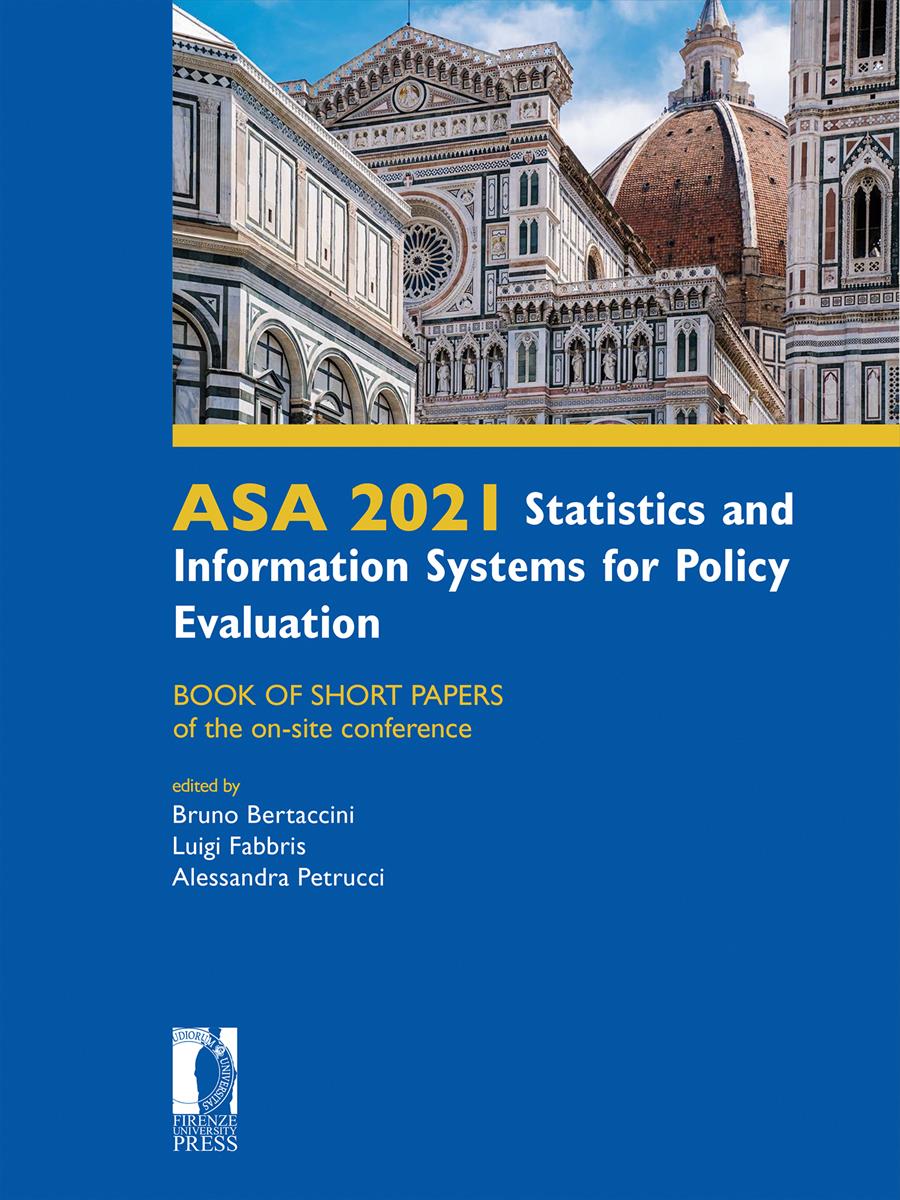- ASA 2021 Statistics and Information Systems for Policy Evaluation
- Edited by Bruno Bertaccini, Luigi Fabbris, Alessandra Petrucci
Gender and Information and Communication Technologies interest: results from PISA 2018
- Mariangela Zenga
- © 2021 Author(s) |
- CC BY 4.0
- DOI: 10.36253/978-88-5518-461-8.07
ICT engagement has become an important key driver regarding the competence for the adults, but even more for young people. As it was pointed out in 2015, ICT interest (a component of ICT engagement) is defined as “content-specific motivational disposition” and describes ”individuals’ long-term preference for dealing with topics, tasks, or activities related to ICT” (Goldhammer et al., 2017). Using data from 2018 Programme for International Student assessment (PISA), this work will show the gender difference in ICT interest for 15-years old students of 23 OECD countries. Moreover a three-level multilevel model will explain the effects of the characteristics of the student, of the school in which the student learns and of the country in which the student livis on the ICT interest.
- Keywords:
- ICT interest,
- Gender difference,
- Three-level multilevel model,
- PISA,
University of Milano-Bicocca, Italy - ORCID: 0000-0002-8112-5627
- BECTA (2008). How do boys and girls differ in their use of ICT? Coventry: BECTA.
- Christoph, G., Goldhammer, F., Zylka, J., and Hartig, J. (2015). Adolescents’ computer performance: The role of self-concept and motivational aspects. Computers & Education,81, pp. 1–12.
- Deci, E. L., and Ryan, R. M. (2000). The ”what” and ”why” of goal pursuits: Human needs and the self-determination of behavior. Psychological Inquiry, 11(4), pp. 227–268.
- Erstad, O. (2012). The learning lives of digital youth-beyond the formal and informal. Oxford Review of Education, 38(1), pp. 25–43.
- Fraillon, J., Ainley, J., Schulz, W., and Friedman, T. (2014). Students’ Use of and Engagement with ICT at Home and School, in Preparing for Life in a Digital Age: The IEA International Computer and Information Literacy Study International Report, eds. J. Fraillon, J. Ainley,W. Schulz, T. Friedman, and E. Gebhardt Springer International Publishing, pp. 125–166.
- Goldhammer, F., Gniewosz, G., and Zylka, J. (2017). ICT Engagement in learning environments, in Assessing contexts of learning world-wide–extended context assessment framework and documentation of questionnaire material, eds. S. Kuger, E. Klieme, N. Jude, and D. Kaplan Heidelberg: Springer International Publishing, pp. 331–351.
- Goldstein, H. (2011). Multilevel statistical models. John Wiley & Sons.
- Hox, J. J., Moerbeek, M. and Van de Schoot, R. (2017). Multilevel analysis: Techniques and applications. Routledge.
- Juhanak L., Zounek J., Zaleska K., Barta O., and Vlckova K. (2019) The relationship between the age at first computer use and students’ perceived competence and autonomy in ICT usage: A mediation analysis. Computers & Education, 141, 103614.
- Muraki, E. (1992) A generalized partial credit model: application of an algorithm. ETS Research Report Series, i-30.
- PISA 2018 Technical Report. PISA. OECD publishing, Paris.
- Rice, N. and Leyland, A. (1996). Multilevel models: applications to health data. Journal of health services research & policy, 1,(3), pp. 154–164.
- Warm, T.A. (1989). Weighted likelihood estimation of ability in item response theory. Psychometrika, 54, pp. 427–450.
- Zylka, J., Christoph, G., Kroehne, U., Hartig, J., and Goldhammer, F. (2015). Moving beyond cognitive elements of ICT literacy: First evidence on the structure of ICT engagement. Computers in Human Behavior, 53, pp. 149–160.
Chapter Information
Chapter Title
Gender and Information and Communication Technologies interest: results from PISA 2018
Authors
Mariangela Zenga
Language
English
DOI
10.36253/978-88-5518-461-8.07
Peer Reviewed
Publication Year
2021
Copyright Information
© 2021 Author(s)
Content License
Metadata License
Bibliographic Information
Book Title
ASA 2021 Statistics and Information Systems for Policy Evaluation
Book Subtitle
BOOK OF SHORT PAPERS of the on-site conference
Editors
Bruno Bertaccini, Luigi Fabbris, Alessandra Petrucci
Peer Reviewed
Publication Year
2021
Copyright Information
© 2021 Author(s)
Content License
Metadata License
Publisher Name
Firenze University Press
DOI
10.36253/978-88-5518-461-8
eISBN (pdf)
978-88-5518-461-8
eISBN (xml)
978-88-5518-462-5
Series Title
Proceedings e report
Series ISSN
2704-601X
Series E-ISSN
2704-5846
